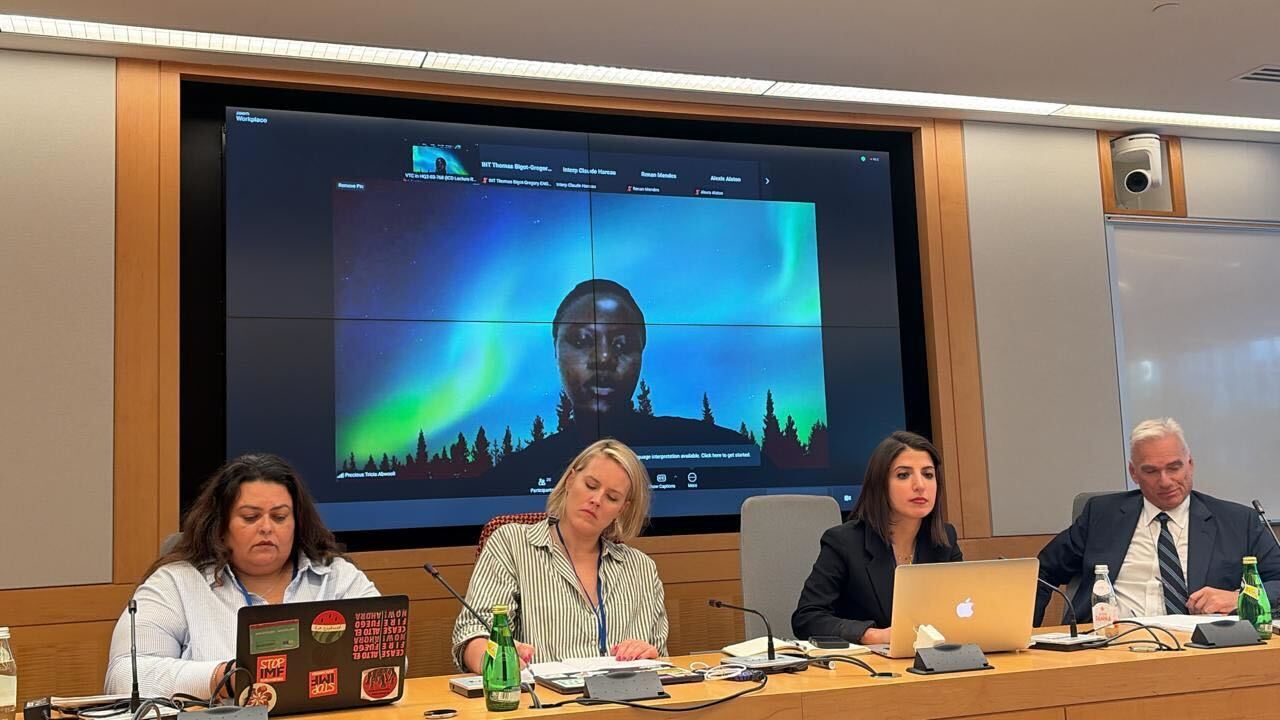Held annually, the IMF and World Bank Meetings remain a key space where global economic rules are negotiated and contested. In 2025, CESR’s engagement in Washington brought together partners and allies to advance human rights, equity, and climate justice at the heart of financial decision-making, demonstrating that transformation is both urgent and achievable.
80 years after the creation of the Bretton Woods institutions, the contradictions of the global financial system are undeniable. Current economic structures deepen inequality, concentrate power, and trap countries in debt and austerity cycles. Yet within this crisis lies an opportunity to rebuild multilateralism on new foundations that redress historical wrongs and center human rights, gender equality, and climate justice.
At a moment of profound reckoning for global economic governance, the Annual Meetings of the IMF and World Bank provide a vital platform where the rules of the global economy are debated, defended, and sometimes rewritten. For CESR, remaining engaged in this space is essential to ensure that human rights, equity, and climate justice are not sidelined but placed at the heart of decision-making.
CESR’s work across Seville, DC, Belém, and Nairobi aims to bridge the gap between UN-led reform and Washington-based decision-making. We continue to affirm that global cooperation must be grounded in states’ binding human-rights obligations, including their duty to cooperate and their extraterritorial responsibilities. Human rights provide a stable and legitimate framework that shifts the focus from creditors’ repayment capacity to people’s survival capacity.
Together with partners, CESR is mobilizing collective power to transform multilateralism, connecting reform agendas from Seville’s Financing for Development conference to Belém’s COP30 and Nairobi’s UN Tax Convention negotiations. The goal: a global financial system that serves people and the planet.
Why we were at the annuals: grounding policy in law, not goodwill
The 2025 Annual Meetings made clear that the central question remains: whose rules will prevail, the market’s, or those of justice, equality, and care?
At the IMF, CESR and its partners engaged in the Comprehensive Surveillance Review (CSR) and Review of Program Design and Conditionality (RoC). We highlighted how IMF policy advice often contradicts states’ human-rights obligations, especially where austerity and fiscal consolidation erode access to health, education, and care. Our interventions underscored that debt service must never crowd out essential spending, that policy conditionalities must not reinforce gender or social inequalities, and that creditors must act in good faith and cooperate to avoid perpetuating injustice.
At the World Bank, CESR challenged the narrative that private capital is the engine of inclusive development. We argued for prioritizing public investment in universal social protection and care systems, an approach reinforced by the Inter-American Court of Human Rights’ recent advisory opinion affirming the right to care as an enforceable human right.
What we accomplished: from principles to systemic change
CESR’s advocacy in Washington connected reform agendas across debt, tax, climate, and gender justice, demonstrating how a human-rights framework can drive systemic transformation.
Advancing rights-aligned IMF reform
In the session From Seville to the CSPF: Reimagining IMF Governance (watch here), CESR and partners advanced the principle of non-retrogression, asserting that austerity measures must never erode minimum living standards. We pressed for debt sustainability analyses that integrate human rights, gender, and climate criteria, challenging the Fund’s outdated orthodoxy and reframing legitimacy through justice and accountability.
Promoting debt justice and a UN framework convention
At Scrutinizing the IMF Role on Debt Issues (recording here), CESR joined allies to push for a statutory, multilateral debt resolution mechanism grounded in human-rights law, transparency, and participation. Our joint publication, Designing Human Rights-Aligned Reforms for Debt Restructurings, lays out the case for a universal forum where all countries, North and South, participate on equal footing and where debt justice replaces creditor dominance.
Reclaiming climate finance for people and planet
In the IFIs’ Evolving Role in Climate Finance workshop, CESR presented Decoding Climate Finance, exposing how current systems tie climate finance to debt and extraction. We championed rights-based alternatives that foreground reparations, progressive taxation, and care economies.
Confronting extreme inequality
At Extreme Wealth: How Much Is Too Much?, CESR and allies advanced the proposal for an “extreme wealth line,” a new metric that reframes inequality as a systemic harm. Governments including Brazil and Spain endorsed the Sevilla Platform for Action, strengthening momentum for redistributive tax measures under the UN Tax Convention.
The bridge to Nairobi
Momentum now turns to Nairobi, where negotiations on the UN Tax Convention mark the most significant shift in global economic governance in decades. The convention’s move from the OECD to the UN represents a long-overdue democratization of global fiscal cooperation, ensuring that Global South countries have an equal voice in shaping the rules. This is a model for what a just global governance architecture can be: one where equity, accountability, and human rights are built into the system rather than added as afterthoughts.
The political test ahead
CESR’s approach is grounded in collective power and alliance building. By bridging advocacy between the UN, IMF, and G20, we reinforce that human rights are binding obligations, not optional aspirations.
The stakes of 2025 remain high. The defining test for the IMF, the World Bank, and the broader international community is whether they can uphold a human-rights-centred approach to economic policy in the face of political pressure to retreat from it. This is not a technical debate, it is a question of justice, legitimacy, and the kind of future we choose to build.
CESR and our partners choose transformation: a new multilateralism grounded in cooperation, equity, and care, anchored in human dignity and collective power.
